 Marcus A. Templar
Marcus A. TemplarNational Security Advisor
Macedonian League
In ancient times, the transmission of knowledge and information relied heavily on manuscripts copied by scribes and scholars. These copyists played a vital role in preserving and disseminating texts from one generation to another. However, the process of copying manuscripts is not infallible, and errors might occur owing to various factors, including human error, a lack of attention to detail, and the deterioration of the original text. Copyists often unintentionally add or omit words, phrases, or sentences, leading to text inaccuracies.
Conversely, editors reviewed and revised texts to ensure accuracy, coherence, and consistency. They corrected errors introduced by copyists, standardized spelling and grammar, and sometimes even added explanatory notes or commentary to clarify ambiguous passages. Editors had an essential part in creating the final version of a document that they would distribute to readers. They meticulously reviewed, corrected, and suggested improvements to the content, ensuring its accuracy and readability. Their expertise and a keen eye for detail were instrumental in transforming the initial drafts into polished, comprehensive documents ready for distribution.
Interventions of numerous people for plentiful reasons have significantly impacted the interpretation and reception of a text.
Translators were another group of individuals who played a crucial role in making ancient texts accessible to a broader audience by rendering them into different languages. Translating ancient texts posed several challenges, including linguistic differences, cultural nuances, and the need to convey the original meaning accurately.
Translators had to handle these issues efficiently to preserve the original text's substance throughout translation. Their work was instrumental in introducing foreign texts to new readerships and facilitating cross-cultural exchanges. Most importantly, a translator should consider the period when a text was written to unravel its meaning and the specific dialect of the time. Occasionally, one should compare the meaning of certain words to identical ones found in other documents of the same period.
The impact of copyists, editors, and translators on ancient documents is multifaceted. On the positive side, their efforts have led to preserving and disseminating valuable texts that provide insights into ancient civilizations' beliefs, practices, and traditions. Without the work of copyists, editors, and translators, many ancient texts would have been lost to history, depriving us of crucial information about our collective past. Their contributions have enriched our understanding of various fields, such as literature, philosophy, religion, and history.
Furthermore, the efforts of copyists, editors, and translators have facilitated the transmission of knowledge across geographical and cultural boundaries. By making ancient texts available in different languages, they have fostered intellectual exchanges and cultural interactions that have shaped the development of human civilization. Disseminating ideas, beliefs, and practices through translated texts has enriched diverse cultures and promoted global understanding and cooperation.
However, it is essential to acknowledge that the work of copyists, editors, and translators has challenges and limitations. Copying errors, editorial interventions, and translation inaccuracies can distort the original meaning of a text, leading to misunderstandings or misinterpretations. The subjective decisions made by editors and translators can influence how readers understand and receive a text, potentially introducing biases or distortions not present in the original version.
Moreover, the process of copying, editing, and translating ancient texts is not always transparent, and the sources of information about the individuals involved in these tasks can be scarce or unreliable. This lack of openness calls into question the validity and dependability of the texts, which have been copied, edited, and translated several times. Scholars and researchers must exercise caution and critically evaluate the textual variants and editorial interventions to accurately reconstruct the original meaning of ancient texts.
In investigating the effects of copyists, editors, and translators on ancient documents, several influential individuals have made significant contributions to studying textual transmission and interpretation. One such figure is Desiderius Erasmus, a renowned humanist and scholar of the Renaissance who produced critical editions of the New Testament that influenced the Reformation. Erasmus's meticulous work as an editor and translator paved the way for a more rigorous and scholarly approach to studying ancient texts. He even created what is known as Erasmian Pronunciation for his convenience, as he stated.
Since the scope of this monograph is about translations, I will not explain Aristeas' work regarding the Greek language and the alphabet.
Notwithstanding, I will explain the flaws of academicians regarding the pronunciation of any of the ancient Greek dialects because they do not differentiate between dialects, regions, or timeframes, consistently using the same pronunciation regardless of the situation.
Classicists insist on using the original pronunciation as they imagine, as if the language never evolved, while additionally, we have no recorded voices of the past. Other scholars argue that using modern Greek pronunciation instead of ancient Greek does not affect the meaning of a text. Modern Greek pronunciation allows for easier comprehension and communication, making texts more accessible to a broader audience.
Furthermore, the essence of a text lies in its content and message, not in the specific sounds used to convey it. The meaning of words and sentences remains unchanged regardless of how they are pronounced. Modern Greek pronunciation can enhance understanding by aligning with contemporary linguistic norms.
Ultimately, studying ancient texts aims to gain insight into their themes and ideas, not to adhere strictly to historical phonetics. Embracing modern Greek pronunciation can make these texts more approachable and relevant today.
I explained some details on ancient Greek dialectal, orthographical intricacies, and pronunciation during his presentation at the 9th International Conference of Greek Linguistics with the title "The Course of the Greek Language throughout the Centuries, approaches to its Study and Analysis" held at Chicago University from October 29, 2009, to October 31, 2009.
Another influential figure in this field is Johann Lorenz von Mosheim, a German historian and theologian who wrote extensively on the history of Christianity and the transmission of biblical texts. Mosheim's works on textual criticism and the history of the Christian Church laid the foundation for modern scholarly approaches to investigating the authenticity and reliability of ancient documents. His emphasis on carefully examining copies, editions, and translations contributed significantly to developing critical methodologies in studying ancient texts.
Furthermore, the contributions of figures such as Sir Thomas Bodley, who founded the Bodleian Library at the University of Oxford, have been instrumental in preserving and disseminating ancient texts to scholars and researchers. The Bodleian Library houses a vast collection of manuscripts, editions, and translations of ancient texts that form the basis of scholarly research in various disciplines. Bodley's vision of a comprehensive library providing access to a wide range of texts has had a lasting impact on investigating the effects of copyists, editors, and translators on ancient documents.
Here are some examples:
The Canary Islands
Most people know of the Canary Islands. Very few people understand that the name Canary has nothing to do with the yellow bird. Pliny the Elder explains the real meaning of the names of the islands. In his Natural History, book 6, chapter 37, paragraph 205, the author states in Latin:
Proximam ei [insulam] canariam vocari a multitudine canum ingentis magnitudinis — ex quibus perducti sunt Iubae duo —; apparere ibi vestigia aedificiorum. cum omnes autem copia pomorum et avium omnis generis abundent, hanc et palmetis caryotas ferentibus ac nuce pinea abundare; esse copiam et mellis, papyrum quoque et siluros in amnibus gigni. infestari eas belvis, quae expellantur adsidue, putrescentibus.
Its translation in English follows:
The one next to it is [the island] of dogs; it contains vast multitudes of dogs of enormous size, two of which were brought home to [satrap] Yuba: some traces of buildings are to be seen here. While all these islands abound in fruit and birds of every kind, this one produces the date palm, which bears the Caryota and pine nuts in great numbers. Honey abounds here, and papyrus and the fish called silurus are found in the rivers. These islands, however, are greatly annoyed by the putrefying bodies of monsters, which are constantly thrown up by the sea.[1]
Then, how did we end up calling the islands Canary? It is the result of a translation error. Canis in Latin means dog, and canaria is the feminine adjectival form that describes the noun "insula," meaning island. English speakers know the meaning of K9, such as dog or police dog. Without getting into details of Latin grammar, the original text is in singular accusative case following the rules of Latin grammar. One must remember that Latin is a Subject-Object-Verb (SOV) language with nouns preceding adjectives.
I think the Coat of Arms of the Islands and the statues of dogs explain a few things.
The Sixth Commandment
An explanation regarding the first translation of the Torah from Hebrew to Greek is deemed necessary because the Septuagint has many translation errors.
Language Background of the Region
Although the belief that the 72 (Greek OB' – Latin LXXII) Hebrew-speaking rabbis translated the Tanakh, i.e., Torah, Nevi'im, Khetuvim, which comprise the Christian Old Testament, facts disprove the above belief.
Cyrus the Great controlled a large empire by appointing regional governors to satrap specific provinces. When Darius the Great became king in 522 BCE, he implemented a standardized monetary system and made Aramaic the empire's official language.
Historical names for the region known as Palestine include Canaan, the Promised Land, the Land of Israel, and the Holy Land.
The first written references to Palestine appear in the 12th century BC, 20th Dynasty of Egypt, using the term Peleshet to refer to neighboring peoples or lands.
As back as the 8th century BC and the conquest of Palestine by the Aramaic-speaking Neo-Assyrian Empire, the Jews of Palestine underwent a process of intergenerational linguistic assimilation as a result of ultimately geographic, demographic, familial, and socio-economic factors by the 3rd century BC. That is true for ALL region inhabitants, regardless of ethnicity, religion, or language, not just the Judeans and Samarians. The language pattern continued beyond the period of Jesus; Hebrew had been established as a sacred language, not for the common folk.
Ptolemy I Soter (Greek: Πτολεμαῖος Σωτήρ or Ptolemy the Savior") was a Macedonian Greek general of Alexander the Great who became ruler of Egypt (323–285 BC). He became a thriving bastion of Hellenistic civilization and Alexandria, a great seat of Greek culture. During the Greek reign of Egypt, I assume the language of the palace at that time was Attic Greek since it was the language of the Macedonian palace in Pella.
Ptolemy's son succeeded his father to the throne as Ptolemy II the Philadelphus from 284 to 246 BC. One year later, he commissioned the Athenian Grammarian Aristeas to codify a new dialect that all Greeks could easily communicate. It took Aristeas (Aristeus) a few years to complete his fine work.
In 263 BC, according to some sources, Ptolemy II had a series of dreams, which he interpreted as God wanting him to contact the Jewish High Priest for guidance. Ptolemy wrote to the High Priest of the Jews, who sent six elders out of every tribe, i.e., 72, and those most skillful in God's laws.
However, the elders, like every Jew then, spoke Aramaic as their first language and were not proficient in Hebrew or Greek. One must remember the means of communication, education, and people's interaction of the times.
Killing versus Murdering in the Bible
Genesis 4:8 But then it was, when they were out in the field, that Cain rose against Abel, his brother, and murdered him.
KILL merely states the fact of death caused by an agency in any manner.
SLAY is a chiefly literary term implying deliberateness and violence but not necessarily motive.
MURDER specifically implies stealth, motive, premeditation, and, therefore, full moral responsibility.
In English, God's command to Moses is not "You shall not kill" but "Do not murder."
Although Christians are taught that the Sixth Commandment states, "Thou shall not kill, the Torah does not state, "Thou shalt not kill," which would be in Hebrew Lo Taharog. The Hebrew root for the word "to kill" is harog, spelled hey-reish-gimel or hrg if one follows the three-letter root verb.
Instead, the Torah says in the Sixth Commandment: Lo Tirtzakh, (לא תרצח) which means "Do not murder" (see Shemot or Exodus 20:13 and Devarim or Deuteronomy 5:17). Here is an explanation of the difference between killing and murder. Starting with Exodus 21:14, "But if anyone schemes and kills someone deliberately, that person is to be taken from my altar and put to death."
Killing is unintentional, coincidental, in self-defense, or war. Murder is killing with guile; it presupposes deliberation and only refers to killing as murder when it is unlawful. However, if a person kills lawfully, she/he does not violate the commandment. Therefore, a difference between הריגה (harog or "killing") and רציחה (tirtzakh, "murder") exists.
Consequently, the correct translation of the verse is: "Thou shalt not murder." After all, one finds numerous wars and killings in the Tanakh (Old Testament). For example, David killed Goliath, but he murdered by proxy Uriah the Hittite. Following Uriah's death, David took Bathsheba, Uriah's wife, as his eighth wife <https://tjpnews.com/torah-makes-distinction-between-murder-killing/>.
The Lord's Prayer
Give us today our daily bread vs. Give us today our needful bread.
Ἐπιούσιον = needful, necessary, substantial, NOT daily.
Another mistranslation comes to us from the Lord's Prayer. The Lord's Prayer was written in the Koinē, or Common dialect of Greek, and then translated into Latin. The Greek Church recites the Prayer as it was given to us, using ἐπιούσιον without any explanation. Those Orthodox Churches who translated the New Testament directly from Greek use words such as needful and necessary.
To verify the translation of the word epiousios, I checked with Serbian and Russian Bibles, both translated from the original Greek based on the Old Church Slavonic насѫщьныи or necessary (Codex Zographensis, Codex Marianus, Codex Assemanius, Book of Sava).
In addition, one finds
in the Serbian Bible nasushni or насушни (necessary)
in the Russian Bible nasushchniy насущный (necessary)
in the Ukrainian Bible nasushchniy насущний (necessary)
in the Bulgarian Bible, nas'shhiya нacъшния (vital),
in Arabic Bible, is الجوهري al-jawhariu (essential) translated from the Greek.
Nevertheless, the book of Proverbs 30:8 explains it better. The text states: "Put falsehood and lying far from me, give me neither poverty nor riches; provide me only with the food I need." All the above have the meaning of "necessary," "needful," "vital' or "substantial" in correspondence with the original meaning of the Greek Koinē.
On the other hand, bibles derived their context directly or indirectly from Latin, like the Czech states dnevni and Croatian svagdasnji, both meaning daily.
I must stress that two Greek brothers, Cyril and Methodius, from the Greek city of Thessaloniki, the innovators of the Cyrillic alphabet, are credited with translating the Bible from the original Greek into the Old Church Slavonic.
Per Lexicon Liddell–Scott–Jones (LSJ), the word ἐπιούσιος did not exist in any of the Hellenic dialects but only in the Lord's Prayer. The word was devised under the model of περιούσιος instead of the Greek κληρονόμος or heir. Such an explanation comes from the book of Origen De Oratione or On Prayer.
Origen (Greek: Ὠριγένης), whose full name was Origen Αdamantios (Ὠριγένης Ἀδαμάντιος), was one of the most important figures of early Christianity. He was probably born in Alexandria in about AD 185 and died in Caesarea (present-day Kayseri, Turkey) in about AD 251.
In his book On Prayer > De Oratione, Origen breaks down each sentence of the Lord's Prayer into eight chapters, from Chapter XII to Chapter XIX. The specific sentence in Chapter XVII, "Give Us Today Our Needful Bread," explains everything.
Here is the Greek text:
http://khazarzar.skeptik.net/pgm/PG_Migne/Origenes_PG%2011-17/De%20oratione.pdf
Here is the English translation of the same: https://www.ntslibrary.com/PDF%20Books/Origen%20on%20Prayer.pdf
Below are the two different meanings of the word epiousion considering the grammatical mood structure of the verb "to give" and the word "needful" in Matthew 6: 5-15 and in Like 11 for comparison.
Matthew 6:11: Give us today our daily bread
Although the text is translated directly from Greek, it is: > Please give us today our needful bread.
In Luke 11:3: Give us each day our daily bread
However, translated directly from Greek, it is: > Give us each day our needful bread.
Here I must explain that the text in Matthew grammatically uses the Imperative mood of the Second Aorist δὸς of the verb δίδωμι, which connotes petition or request. Nevertheless, the text in Luke uses the Imperative mood of present tense δίδου of the same verb, which denotes command. Mortals have no power to demand anything from the Almighty.
Christian theology adopted the word ousia or substance from ancient Greek philosophy as a philosophical and theological concept. Numerous ancient Greek philosophers, such as Plato and Aristotle, utilized it as a significant identifier for philosophical conceptions of essence or substance.
Returning to the Lord's Prayer, we must explain that Jesus spoke in the Aramaic language, the language the people of Palestine spoke at the time. Aramaic is, one could say, the basis of modern Assyrian or Neo-Aramaic of the North-East. We are unaware of the language of the original prayer. However, the one we have in Koinē Greek is what the evangelists Matthew and Luke gave us. We do not know what the original word was that the evangelists chose the word ἐπιούσιον (epiousion is grammatically accusative case; nominative case is ἐπιούσιος).
If the evangelists thought that the original word translated as daily, they would refer to it as ἡμερήσιον, an adjective from the noun ἡμέρα. That would have produced the sentence τὸν ἂρτον ἡμῶν τὸν ἡμερήσιον, which translates to our daily bread. Nevertheless, the Lord's Prayer in the original Greek includes the word ἐπιούσιον. Ἐπιούσιον is a word that is composed of two words: the preposition epi (ἐπί) = on, above, over, on to, super, hyper, and the adjective of the noun ousia (οὐσία) = substance, essence).
We encounter such an adjective in the original Greek in "The Symbol of Faith" or "Σύμβολον τῆς Πίστεως." Article 3 states that Jesus Christ is «ὁμοούσιος τῷ πατρί» or "of one essence with the Father."
A useful explanation comes to us on the Advent website.
The most conspicuous difficulty in the original text of Our Father concerns the interpretation of the words artos epiousios, which in accordance with the Vulgate in St. Luke, we translate "our daily bread", St. Jerome, by a strange inconsistency, changed the pre-existing [Latin] word quotidianum into supersubstantialem[ii]
[= supersubstantial] in St. Matthew but left quotidianum in St. Luke. The opinion of modern scholars upon the point is sufficiently indicated by the fact that the Revised Version still prints "daily" in the text but suggests in the margin "our bread for the coming day." At the same time, the American Committee wished to add "our needful bread." (https://www.newadvent.org/cathen/09356a.htm)
The matter has nothing to do with doctrine but much to do with lexicon. It indicates that ancient scholars strived to interpret the new word (epiousion) to its correct equivalent.
An explanation of some grammatical rules of the Koinē Greek is necessary. When a preposition precedes a noun or adjective, the preposition emphasizes the meaning of the noun or adjective according to the importance of the preposition. Following the above rule, the word epiousios means more than "necessary," "needful," or "substantial." The emphasis of the preposition changes the meaning to "very substantial" or "supersubstantial," or in Greek, "ὑπερουσιώδης" as St. Jerome put it.
I have published my arguments in the monthly magazine "New Church Life" (Volume CXXI, April 2001, No. 4, pages 153-159).
Here is the online version of the above, with all fathers of the Church over the years in regards to the issue at hand (Thesaurus Linguae Graecae (TLG®) https://stephanus.tlg.uci.edu/Iris/demo/tsearch.jsp#s=1
CONCLUSION
Investigating the effects of copyists, editors, and translators on ancient documents is crucial for understanding and interpreting historical texts. These individuals play a pivotal role in preserving, disseminating, and interpreting ancient texts, enriching our understanding of civilizations, cultures, and historical events.
Influential figures such as Desiderius Erasmus, Johann Lorenz von Mosheim, and Sir Thomas Bodley have significantly contributed to studying textual transmission and interpretation.
However, their interventions can also introduce errors, biases, and distortions, highlighting the need for critical evaluation and careful reconstruction of the original meaning. The problem is that people do not realize the difference between reading and translating a text from reading into the text, interpreting, and concluding their choice of meaning, which the text does not explicitly indicate.
We know that Greek had four main dialects (Ionic, Attic, Aeolic, Doric), and if we add the Koine or Common dialect, there were five, and according to Aristotle, 204 subdialects. The ONLY way that one can speak the way ancient Greek speakers pronounced their particular speech is if we had a voice recorded at specific times since the pronunciation kept changing from time to time but also from subdialect to subdialect to dialect. We know about it because we have documented evidence of different spellings of identical words. The only dialect that was officially standardized was the Koine dialect.
https://www.helleniccomserve.com/pdf/KatadesmosFinalProduct31.pdf
___________________________
Endnotes:
[i] https://www.perseus.tufts.edu/hopper/text?doc=Perseus%3Atext%3A1999.02.0138%3Abook
%3D6%3Achapter%3D61
[ii] Supersubstantial, or in Greek, ὑπερουσιώδης
_____
About Marcus A. Templar
Professor Marcus A. Templar is a former U.S. Army Cryptologic Linguist (Language Analyst), Signal Intelligence and All-Source Intelligence Analyst. During his career as a U.S. Intelligence Officer, besides organizational duties, he discharged the responsibilities of a U.S. Army Observer/Controller, Instructor of Intelligence Courses specializing in Deconstruction of Strategies, Foreign Disclosures Officer, and Translator Interpreter of Serbo-Croatian. He is the Macedonian League's National Security Advisor.
_____
About the Macedonian League
We are an international professional Hellenic advocacy group. Our primary purpose is to advance our interests to informed and responsive governments on issues concerning Greece's national security and territorial integrity. As of 12 February 2019, the Macedonian League's main focus is on the “Prespes Agreement", as this Agreement is a serious national security issue for Greece and the wider Balkan region. The Macedonian League also focuses on exposing and combating anti-Hellenism and analyzing political developments in Skopje.
For more information, follow us on: Website, Facebook, Twitter



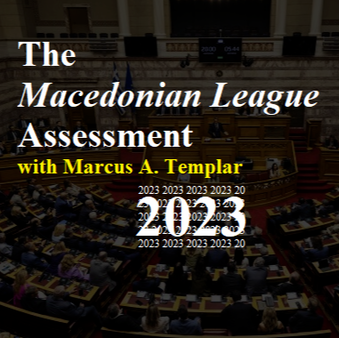

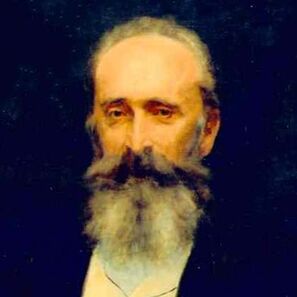
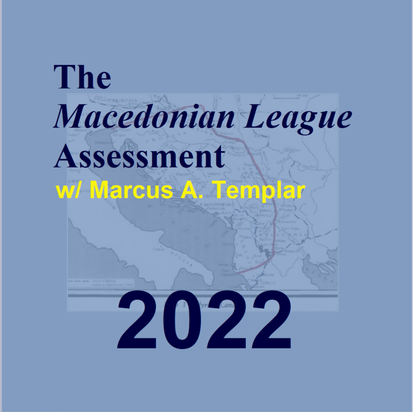

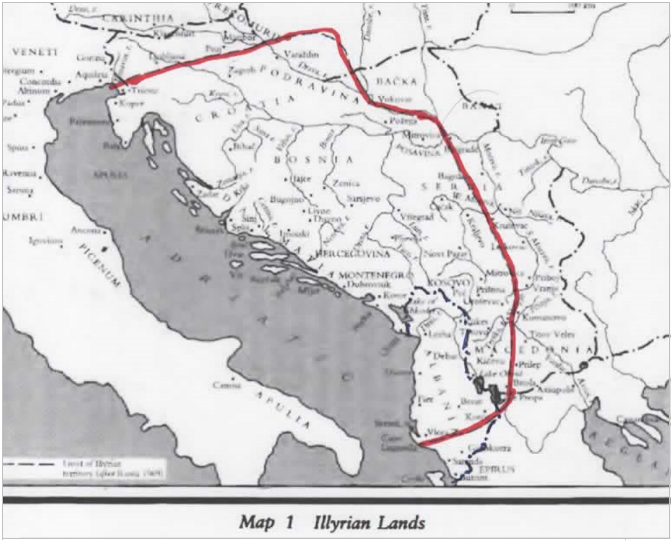

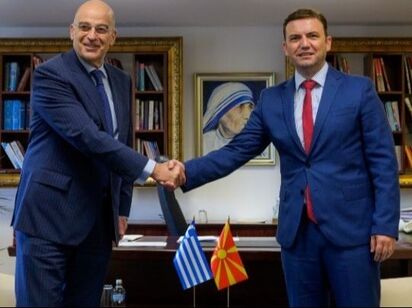
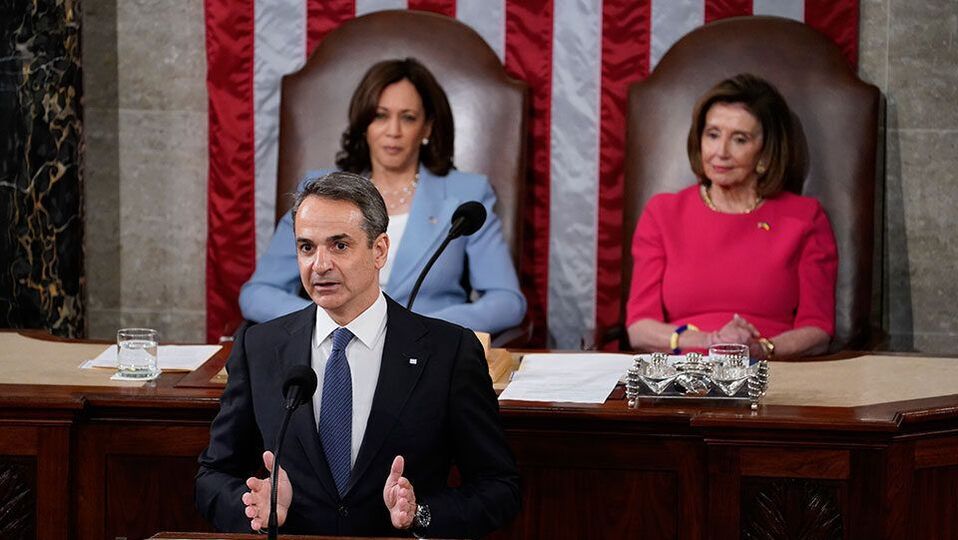
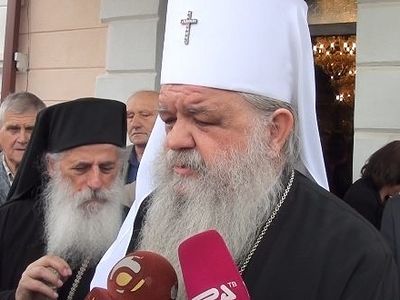
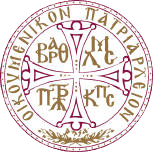
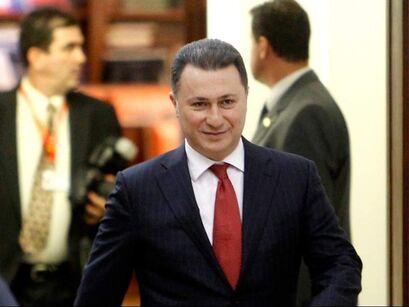
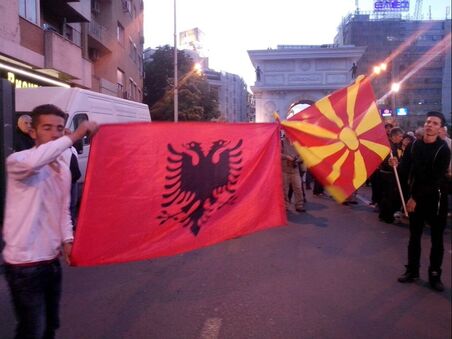

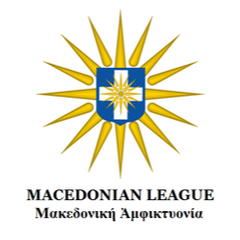
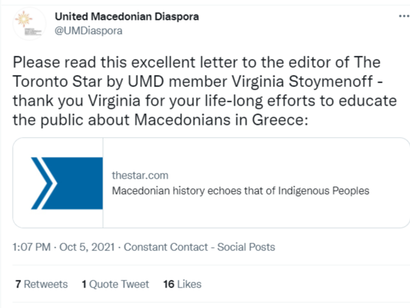
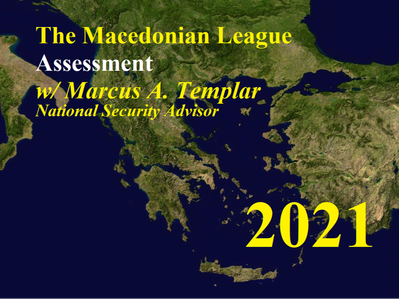






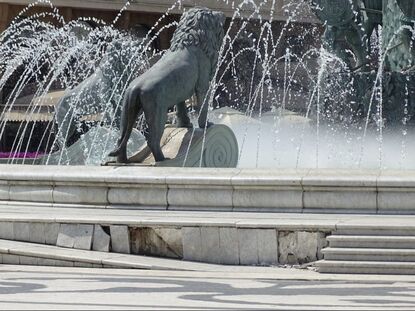


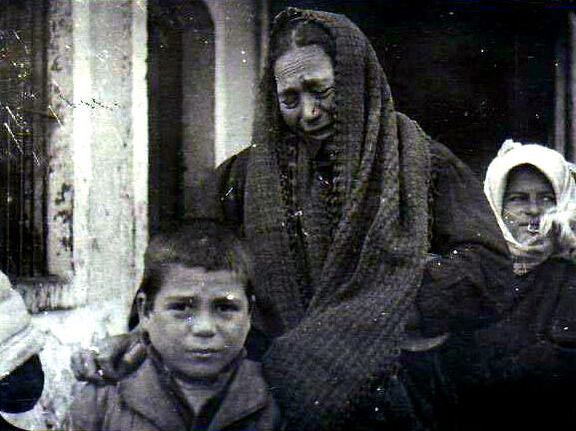
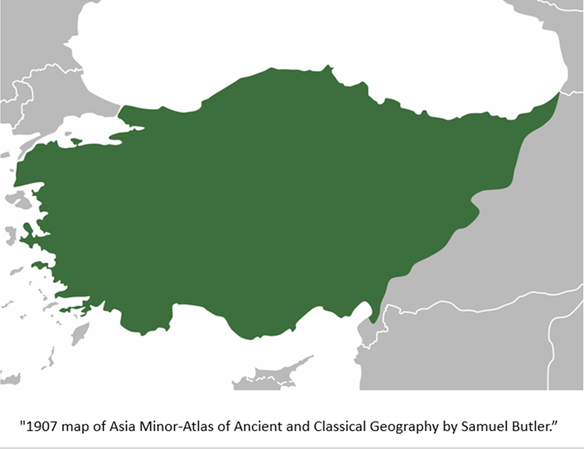
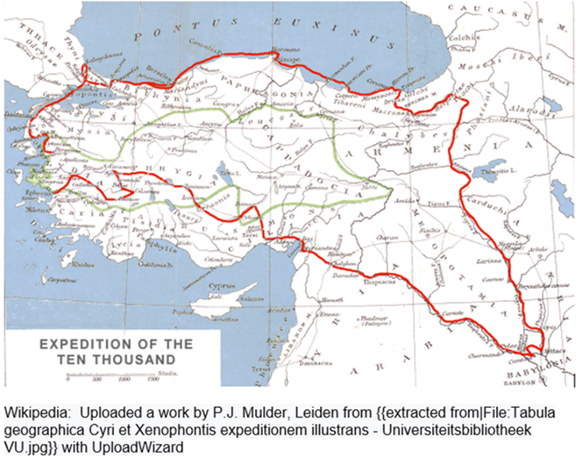
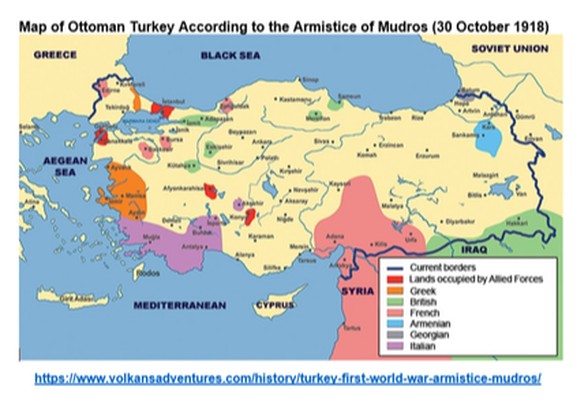
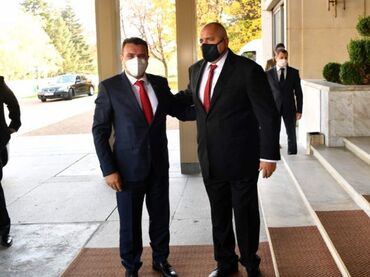
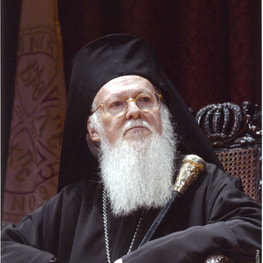
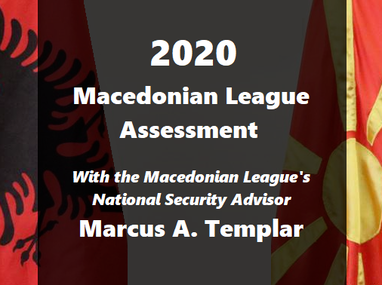
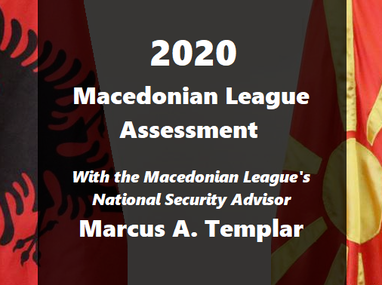
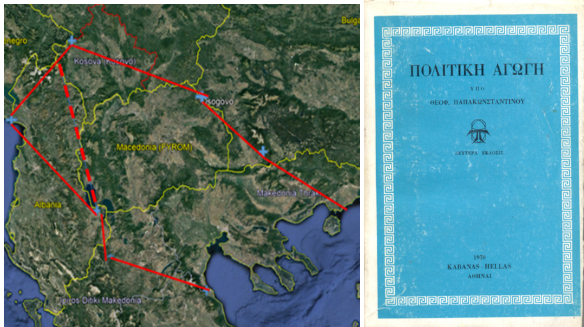
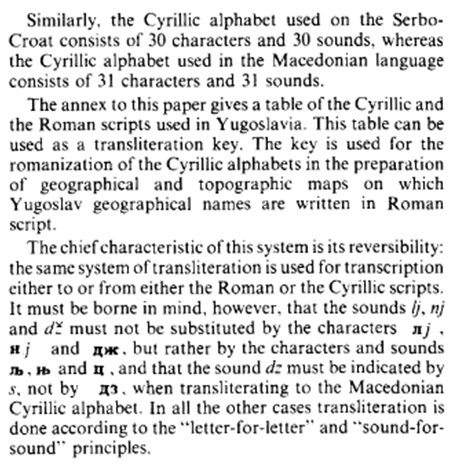
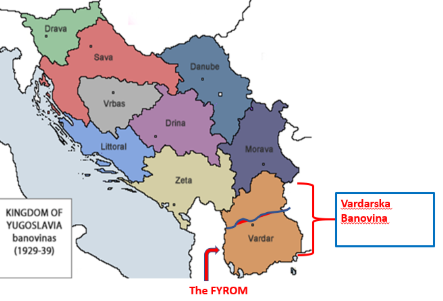
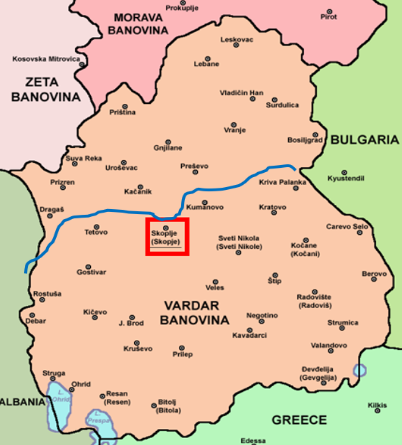
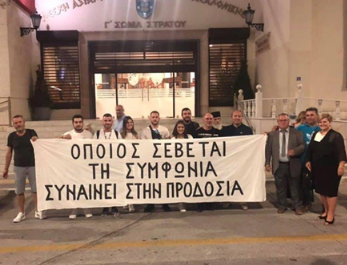
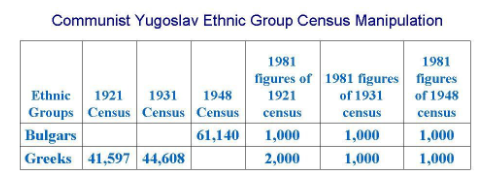
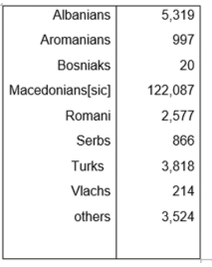
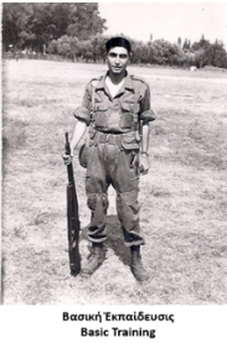
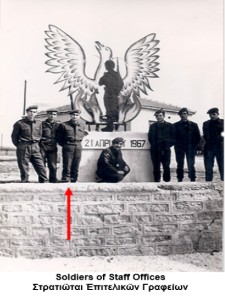
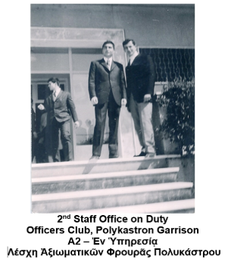

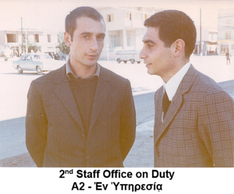
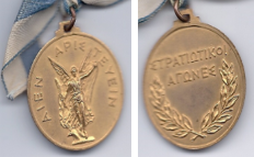
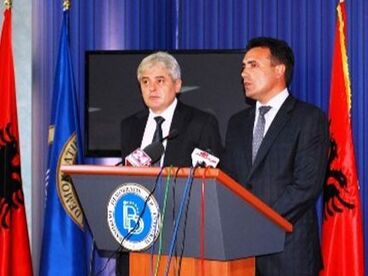
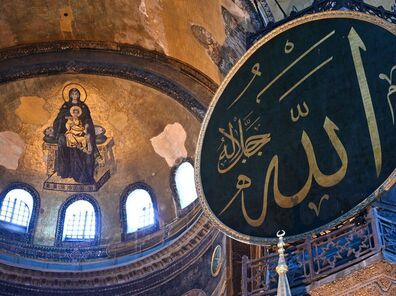
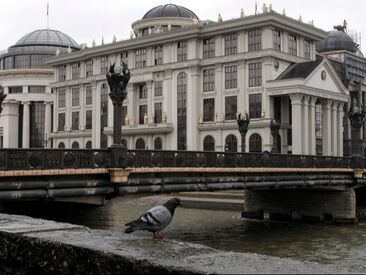
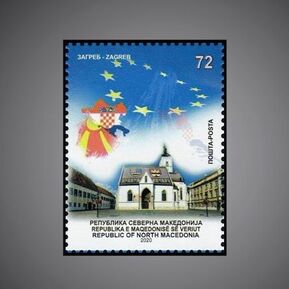
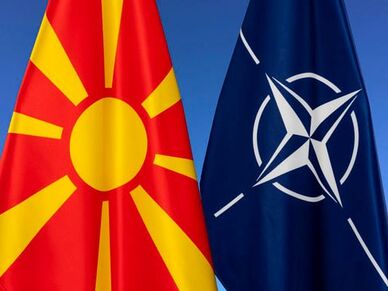


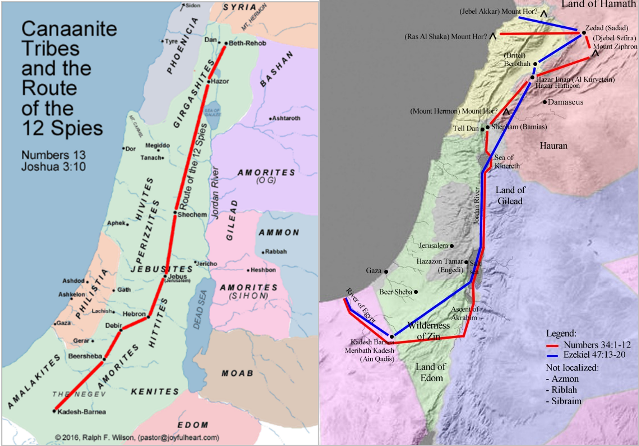

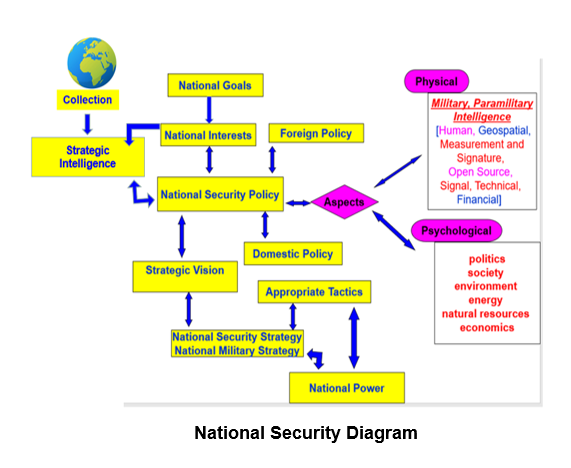
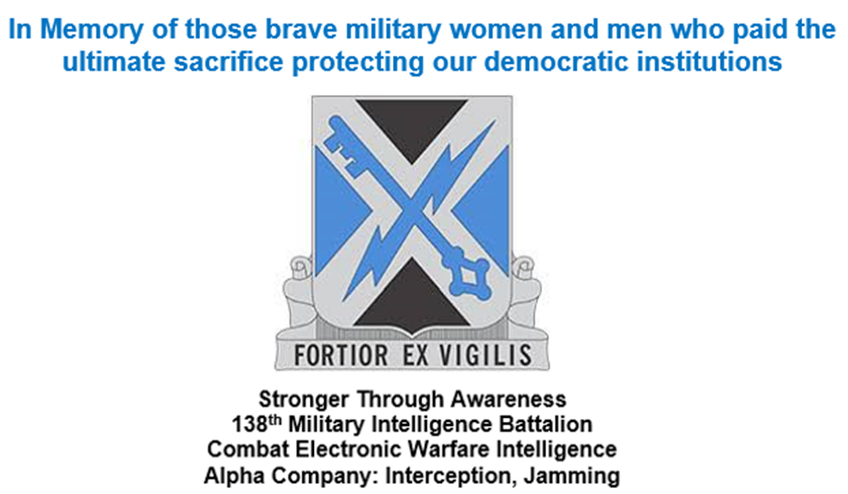



 RSS Feed
RSS Feed